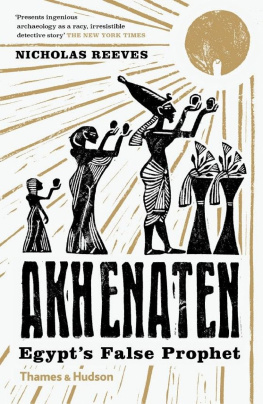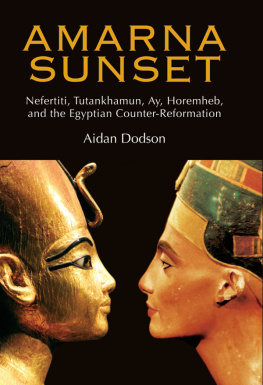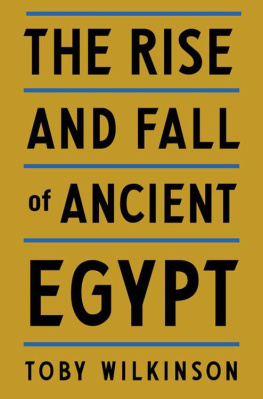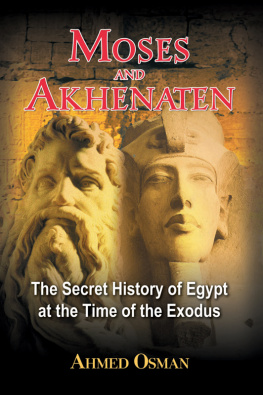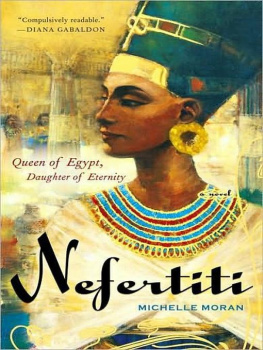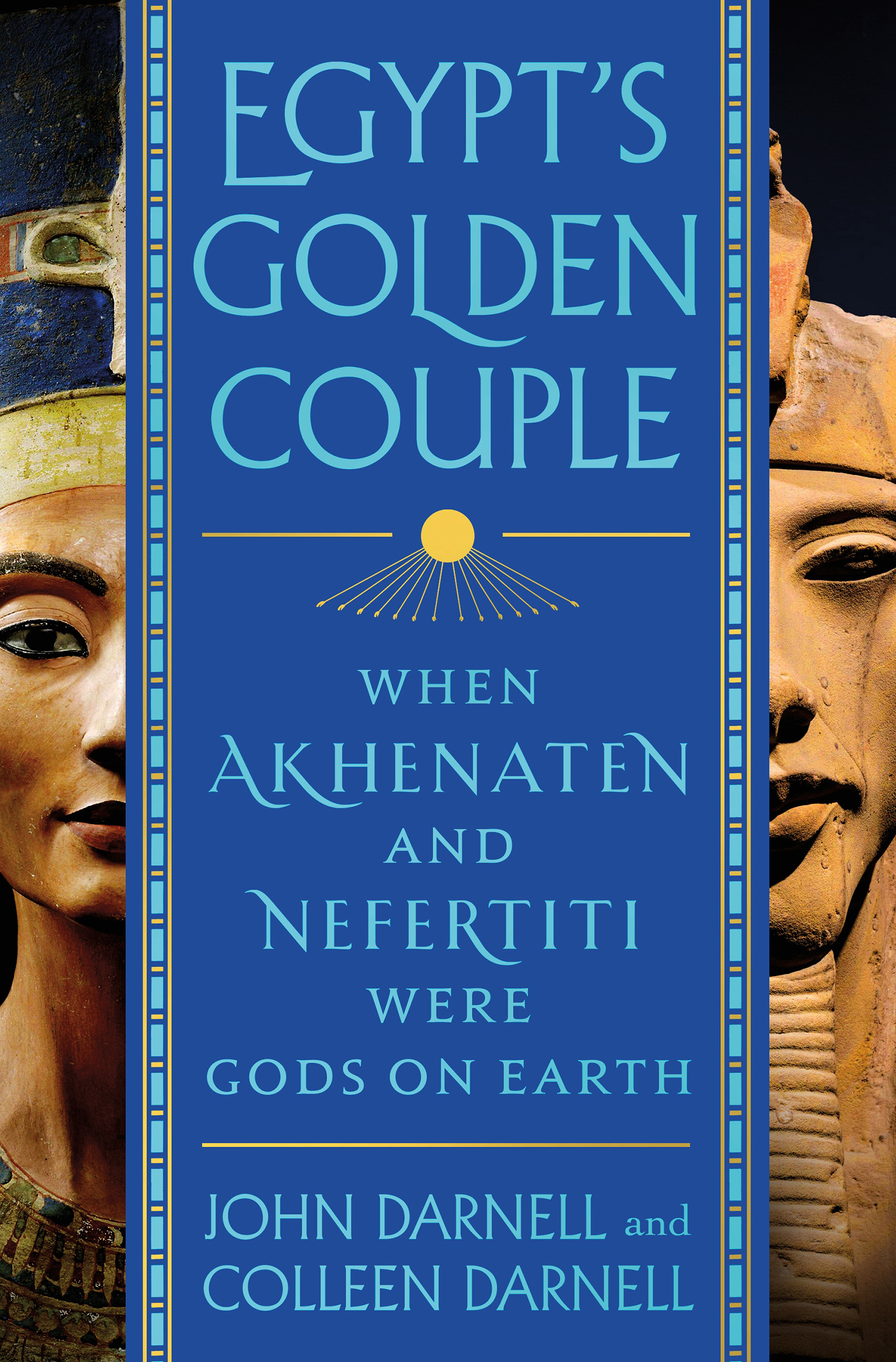Contents
List of Figures
Guide
Pagebreaks of the print version

The author and publisher have provided this e-book to you for your personal use only. You may not make this e-book publicly available in any way. Copyright infringement is against the law. If you believe the copy of this e-book you are reading infringes on the authors copyright, please notify the publisher at: us.macmillanusa.com/piracy.
Give to him the love of your heart like the innumerable grains of sand on the shore, the scales of fish in the river, and the strands of hair of cattle! Allow him to remain here until the swan becomes black, until the black bird becomes white, until the mountains arise and depart, until the flood flows south.
Hymn beseeching the god Aten to bestow love and life on Akhenaten
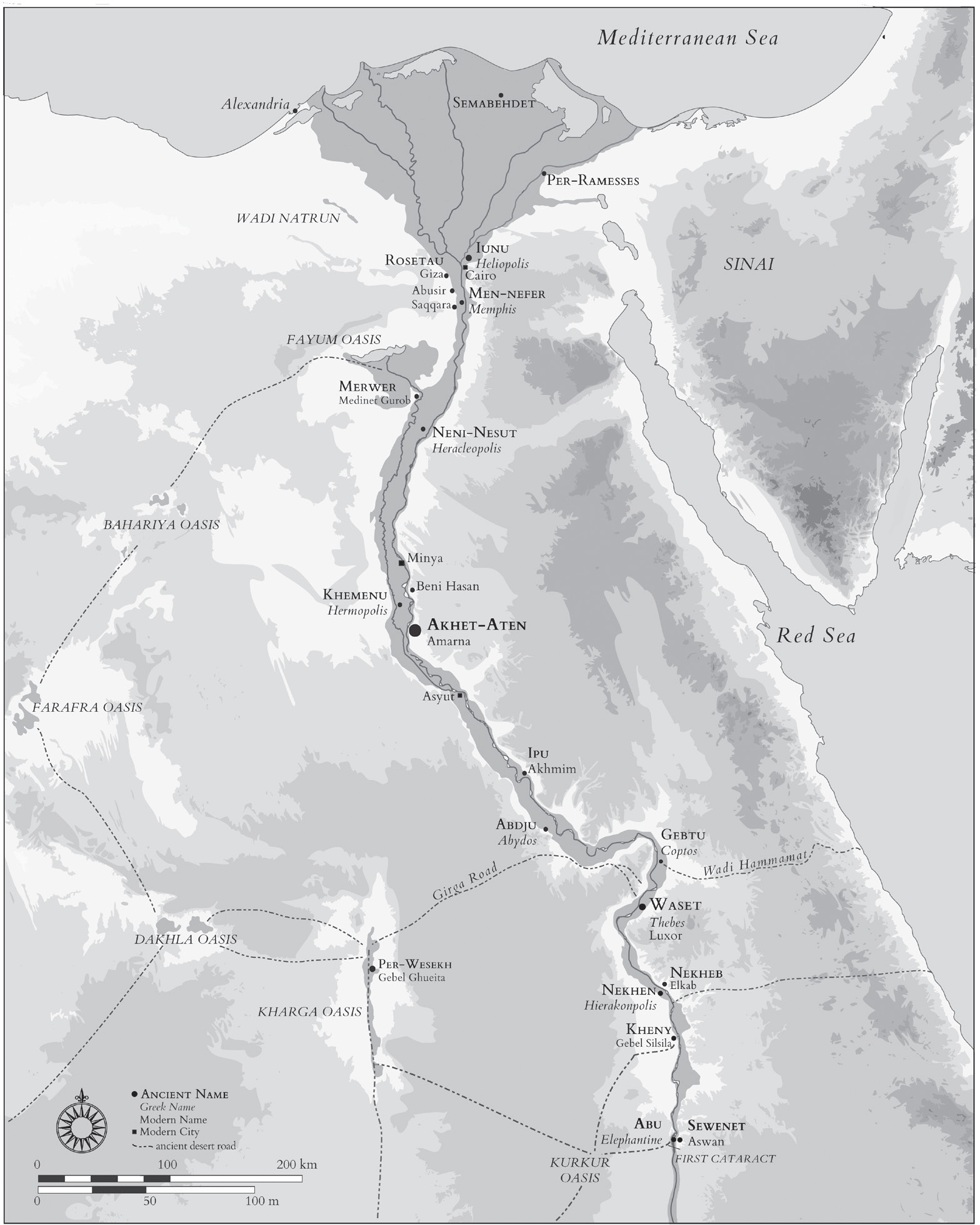
MAP OF EGYPT
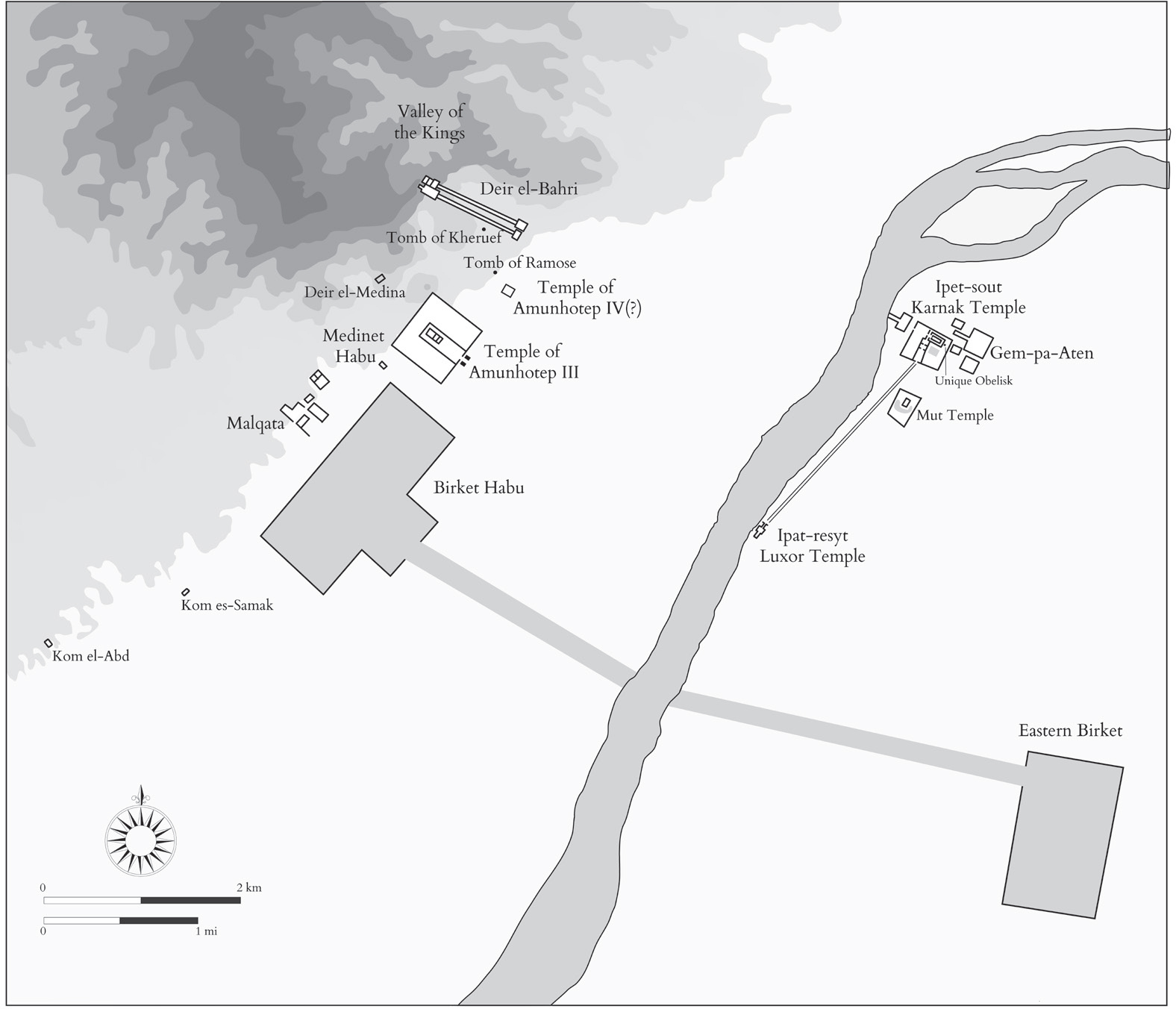
MAP OF WASET

MAP OF AKHET-ATEN
FAMILY TREE OF THE LATE EIGHTEENTH DYNASTY
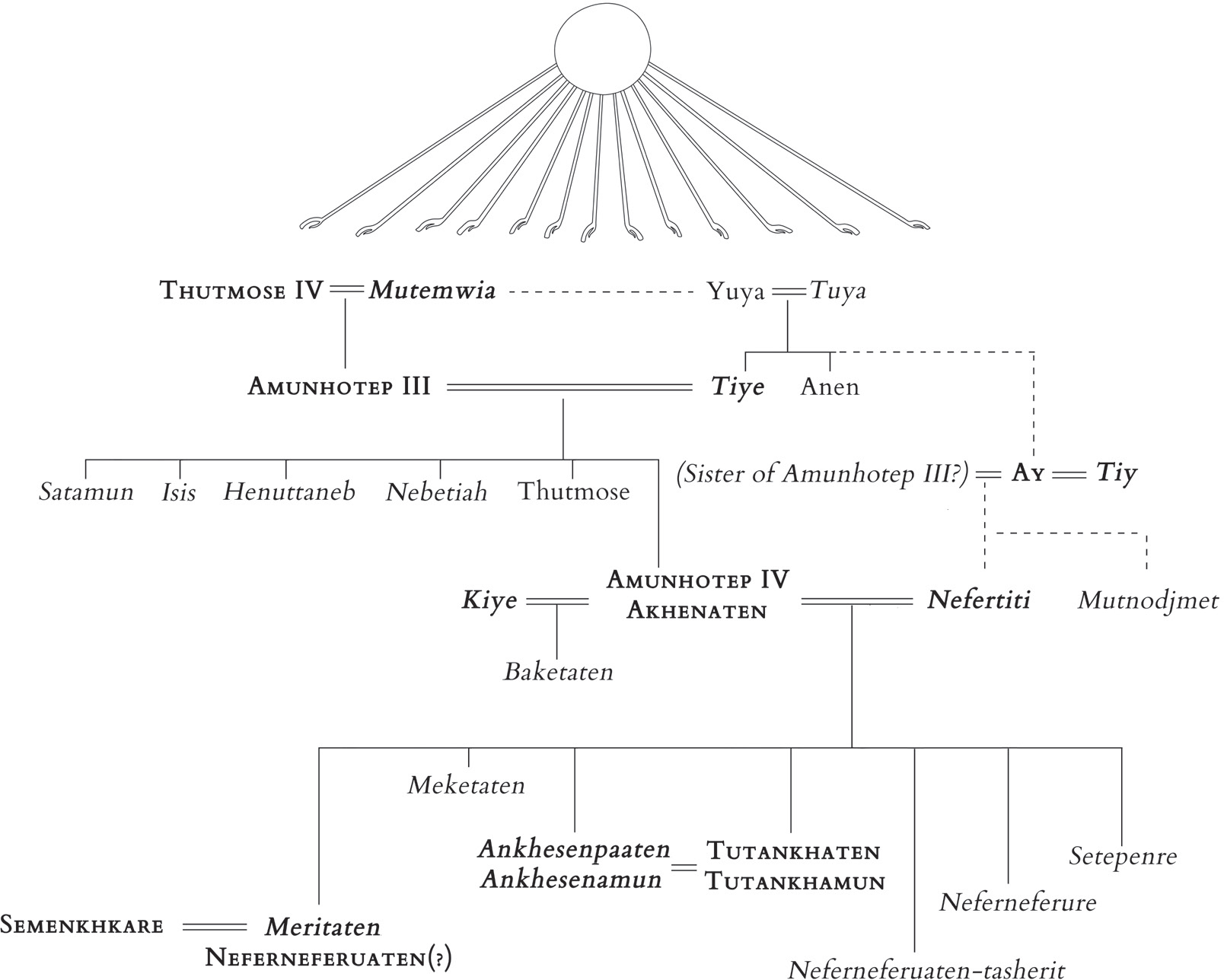
Akhenaten (coronation name Neferkheperure) begins his reign as Amunhotep IV, ruling for a total of seventeen years, for most of them alongside his great royal wife Nefertiti.
Amun, king of the gods, whose name means Hidden One, is a creator deity and divine imperial protector of Egypt who is often syncretized with the sun god, Re.
Amunhotep III (coronation name Nebmaatre) rules for thirty-eight years and celebrates three jubilee festivals with his great royal wife Tiye.
Ankhesenamun (born Ankhesenpaaten) is the third daughter of Akhenaten and Nefertiti and becomes the wife of her brother Tutankhamun.
Aten, the divine solar disk, is given two cartouches during the reign of Akhenaten that identify the god as Re-Horakhty, who rejoices in the horizon in his name of light who is in the sun disk, which is later changed to Living one, Re, ruler of the two horizons, who rejoices in the horizon in his name of Re, the father, who has returned as the sun disk.
Ay, gods father during the reign of Akhenaten, is a member of an important family from Ipu (modern Akhmim). He may be Nefertitis father, and, after the death of Tutankhamun, Ay becomes king of Egypt.
Kiye is the greatly beloved wife of Akhenaten and likely the mother of the princess Baketaten; her family is unknown, and she falls out of favor late in the reign of her husband.
Meritaten is the eldest daughter of Akhenaten and Nefertiti, great royal wife of Semenkhkare, and possibly rules as King Neferneferuaten.
Neferneferuaten (coronation name Ankhetkheperure) is a female king, likely the princess Meritaten, but possibly Queen Nefertiti.
Nefertiti is the great royal wife of Akhenaten, and her cartouche often includes the epithet Neferneferuaten. She bears her husband six daughters and a son.
Semenkhkare (coronation name Ankhkheperure) is of unknown origin and likely rules for less than a year as co-regent of Akhenaten; his chief royal wife is Meritaten.
Tiye is a member of an important family from Ipu, the great royal wife of Amunhotep III, and mother of Akhenaten.
Tutankhamun (born Tutankhaten) is a son of Akhenaten and Nefertiti who marries his sister Ankhesenpaaten (later Ankhesenamun). He is king of Egypt for nine years.
A pale and sickly young man ascends the throne of Egypt. Sheltered by his keen-witted and powerful mother, he uses his newfound authority to study an ancient religionthe cult of the sun god. His scholarly explorations in temple libraries lead him to revolt against Amun-Re, king of the gods, and the deitys corrupt priesthood. The young king is as mentally robust as he is physically awkward and strangely proportioned. His strong and unyielding will is at odds with the brittle weakness of his spindly limbs. The young ruler quickly perceives how the priesthood, glutted with booty from the military campaigns of his pugnacious predecessors, now feeds like a bloated parasite off the body of the Egyptian people.
Only in his beautiful young wife does the king find consolation and support. Together they create a revolutionary cult of a loving and universal god, who cannot be contained within the often animal-headed and stiffly posed idols of the old religion. The royal couple devote themselves and all of Egypts resources to the worship of a single god who is everywhere, and yet without physical form, except for the blazing orb of the sun. The young ruler rejoices in the love that his universal solar deity bestows upon humanity, reserving his ire for the ancient gods, whose statues and reliefs the kings devoted adherents zealously attack. The king shows his devotion to his one true father in ostentatious expressions of love for his own family, especially his daughters, doting on his ever-increasing offspring and his serenely gorgeous consort.
In a few short years, the new pharaoh presides over a kingdom ruled by peace and a higher calling, a new religion that lifts Egypt out of the animal-worshipping superstitions of yore. Where once priests stalked through temples to offer on darkened altars, now the royal family presents tables of food in vast, open courts to the solar father whose light suffuses the white-washed and roofless temples of the kings new city. At the center of this royal court of love, basking in the light of the benevolent solar deitywhose hands literally caress the bodies of the royal familyis the worlds first individual. He is a ruler of such moral strength as to dare to challenge the conventions of an already ancient civilization, and a man of profound learning and flights of spiritual ecstasy who composes beautiful poetry in honor of his god.
A ruler of ravenous sexual appetites and a tyrannical disposition becomes ruler of Egypt. Never as intelligent or as accomplished as his siblings, the king has been warped by the neglect of his father and the domineering personality of his mother. As pharaoh, he closes the temples of Egypt, the very lifeblood of a country whose economy depends on the fields, flocks, and workshops associated with the massive complexes. Following the luxurious reign of his father, and with an obsessive focus on his own divinity, the new ruler plunges Egypt into nearly two decades of darkness and tumult.
The officials in his bureaucracy are loyal to him alone. In their abject groveling, they manipulate the misshapen heretic who controls Egypt with an iron fist. The king and his court revel in the delights of the flesh, gorging themselves on daily banquets, reclining languidly in painted chambers, their sense of time all but erased by the unending cycle of slothful indulgence. The incestuous desire of the king begets two daughters who are simultaneously his granddaughters. One daughter-wife dies in childbirthherself barely beyond childhood, brought low by her fathers twisted impulses. The population of Egyptoutside of the small group of obsequious courtiershave never witnessed a time so full of misery.


